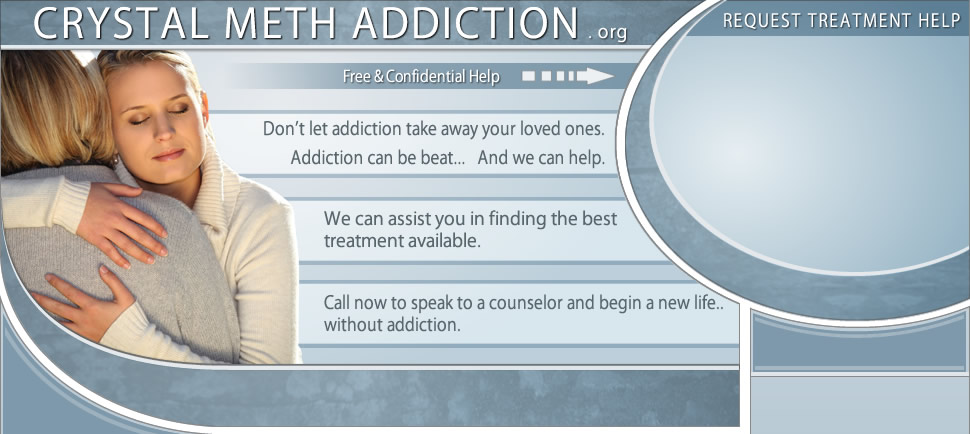Crystal Meth Help
Crystal Meth Effects and Symptoms
- Crystal Meth Effects
- Crystal Meth Withdrawal Symptoms
- Crystal Meth Symptoms
- Crystal Meth Side Effects
- Crystal Meth Overdose
- Injecting Meth
- Ingesting Meth
- Smoking Meth
- Meth and HIV
Crystal Meth Information
- Crystal Meth Addiction Treatment
- Crystal Meth Statistics
- Crystal Meth Facts
- Crystal Meth Prices
- Crystal Meth Street Names
- Crystal Meth Pictures
- Crystal Meth User Pictures
- Teen Meth Addiction
- Meth Addiction
- Drug Rehab for Meth Addiction
- Meth Intervention
Crystal Meth News
Drug Rehab for Meth Addiction
Drug rehab for meth addiction should be able to provide effective drug treatment in a highly structured, drug free setting. The ultimate goal of any type of drug treatment for meth addiction should always be to teach a person who is in recovery new skills can help them to deal with their cravings for meth in order to prevent a drug relapse. A top-notch drug rehab for meth addiction will offer a screening process in order to determine if the person that is seeking help for a meth-related substance abuse problem is actually ready to commit to the recovery process. The drug treatment counselor will also find out about the potential clients drug history, their current living situation, and mental status; this pre-treatment screening process will give the counselor a chance to determine if the meth addict is a good candidate for the treatment that will follow.
Loved ones should seek out a quality drug rehab for meth addiction upon the first sign of meth use, because of the extensive health problems that this toxic stimulant has commonly been reported to cause. Chronic meth use constricts blood vessels, which can cut off blood circulation to various different parts of the body; thus, weakening the meth user's body tissues, which will cause the skin to be damaged much more easily and inhibit the body's natural ability to repair itself. When this occurs, sores on a meth user's body will begin to take much longer to begin to heal, and their skin will begin to lose its elasticity. Meth users will often be covered in scabs, as the result of continuously picking at their skin, as they experienced hallucinations that convince them that there are insects beneath their skin. Another negative side effect of meth is that it has been reported to cause a rise in the body temperature of the user; unfortunately, this particular side effect has the potential to cause permanent brain damage. If all of the above listed things were not enough reason to immediately find a quality drug rehab for meth addiction, meth use also causes extreme tooth decay; this condition, which is commonly referred to as "meth mouth" will often destroy every tooth in the users mouth, within a very brief period of time.
In attending a quality drug rehab for meth addiction, there are many different factors that substance abuse counselors will first need to consider, before they will be able to develop a personalized meth recovery treatment plan. The counselor will need to know how long the person attending the drug treatment center has been addicted to meth in order to determine how severe the substance abuse problem really is; additionally, the drug rehab center will need to be informed about any meth-related health problems that exist.
Although there are many different types of drug rehab for meth addiction, an individual who is struggling with a long term addiction to this toxic stimulant will need to attend a long term inpatient drug treatment center for the best possible meth recovery results. An effective drug rehab for meth addiction should last for at least for a period of 90 days, and in cases of a severe meth addiction problem, could potentially last for over a year.
Drug rehab for meth addiction will need to be extremely comprehensive; additionally, with the high rate of relapse that has been reported in relation to meth, a lengthy and intensive after care program will need to be effectively administered. A drug rehab for meth addiction will need to offer an intensive amount of relapse prevention education, which teaches the patient in drug treatment how to be able to identify meth triggers; additionally, the recovery program needs be sure to equip a former meth addict with the life skills that will be necessary to be able to effectively overcome these familiar triggers.
Before drug rehab for meth addiction can truly begin in earnest, the person in treatment will have to undergo the meth detoxification process. Because of the various different ways that methamphetamine negatively impacts the user's brain; this initial drug treatment step will be a two-fold process that involves both physical and the psychological health issues. When a person in a drug rehab for meth addiction is going through the detox process, they will often begin to experience many painful and often debilitating meth withdrawal symptoms; thus, because of the severity level of many of these symptoms, a person should only undergo the meth detox process, under the watchful eye of caring treatment professionals, at a drug rehab for meth addiction.
When a person is attending a drug rehab for meth addiction, the step that follows the meth detox is counseling, which will begin to address the behavioral issues that are related to this substance abuse problem; this can be accomplished through long term individual cognitive therapy sessions or by attending group sessions with fellow meth addicts. Quality drug rehabs for meth addiction will not only help a former meth user to be able to identify specific relapse triggers, but they will teach the person in treatment behaviors that are effective in relation to counteracting them.
A quality drug rehab for meth addiction will address every aspect that is related to preventing a meth relapse, including helping the former addict to develop a highly effective aftercare relapse prevention plan. Developing such a plan will ensure that the former meth addict will be able to continue to maintain abstinence, long after they have successfully completed the drug rehab for meth addiction. During the aftercare phase of the drug rehab for meth addiction, the former addict should have easy access to professional assistance, in order to have access to an adequate level of post treatment support.
The ultimate goal of a quality drug rehab for meth addiction is to provide a former meth addict will all of the tools that they will need to be able to stay sober, upon completing all phases of the meth recovery treatment program.

